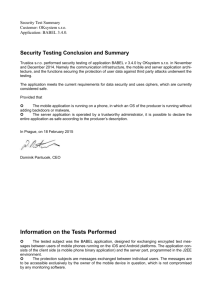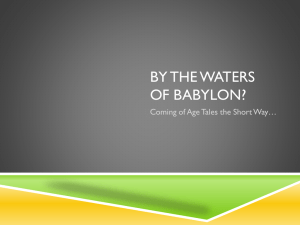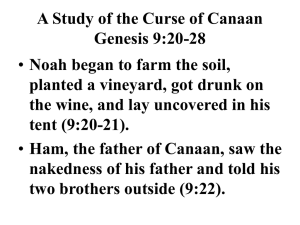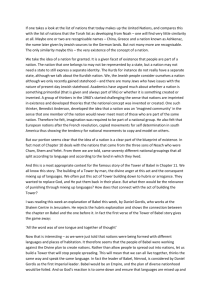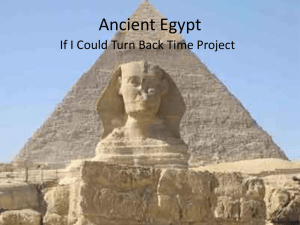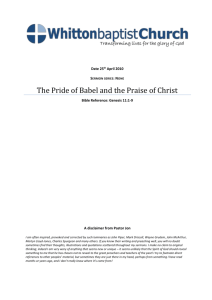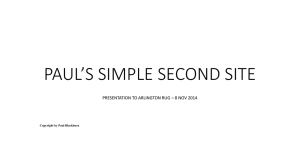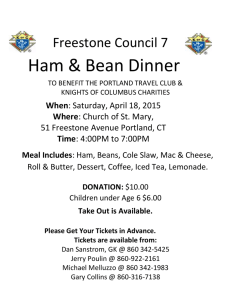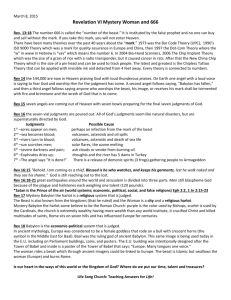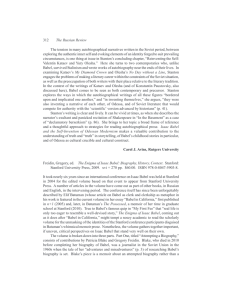A Tale of Two Cities
advertisement
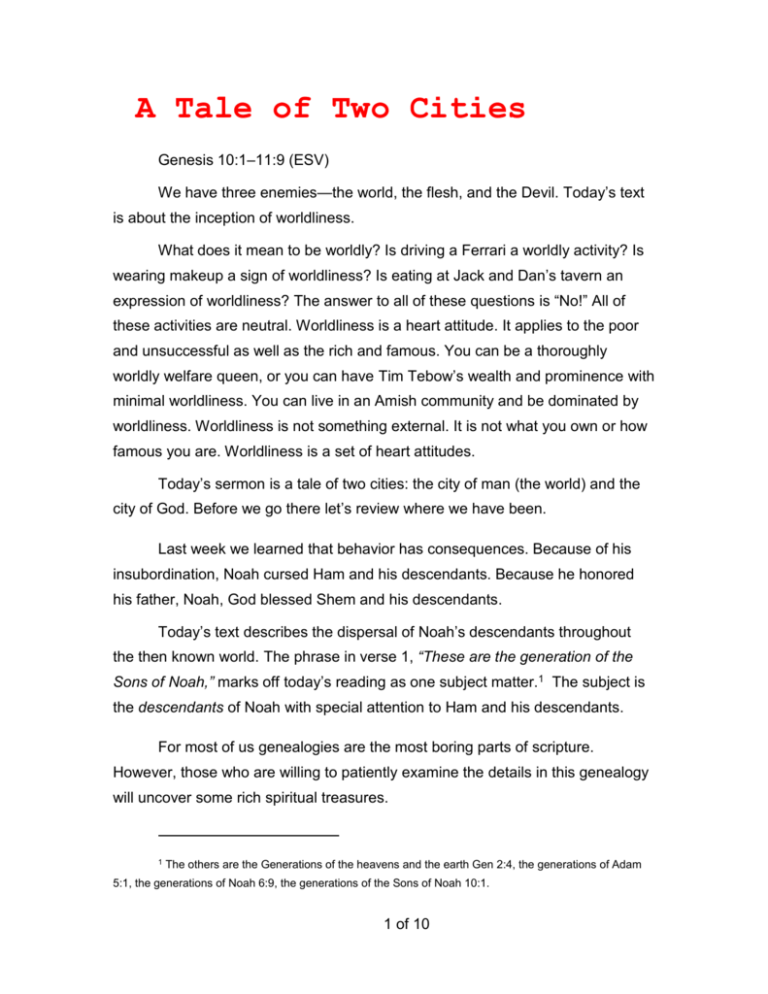
A Tale of Two Cities Genesis 10:1–11:9 (ESV) We have three enemies—the world, the flesh, and the Devil. Today’s text is about the inception of worldliness. What does it mean to be worldly? Is driving a Ferrari a worldly activity? Is wearing makeup a sign of worldliness? Is eating at Jack and Dan’s tavern an expression of worldliness? The answer to all of these questions is “No!” All of these activities are neutral. Worldliness is a heart attitude. It applies to the poor and unsuccessful as well as the rich and famous. You can be a thoroughly worldly welfare queen, or you can have Tim Tebow’s wealth and prominence with minimal worldliness. You can live in an Amish community and be dominated by worldliness. Worldliness is not something external. It is not what you own or how famous you are. Worldliness is a set of heart attitudes. Today’s sermon is a tale of two cities: the city of man (the world) and the city of God. Before we go there let’s review where we have been. Last week we learned that behavior has consequences. Because of his insubordination, Noah cursed Ham and his descendants. Because he honored his father, Noah, God blessed Shem and his descendants. Today’s text describes the dispersal of Noah’s descendants throughout the then known world. The phrase in verse 1, “These are the generation of the Sons of Noah,” marks off today’s reading as one subject matter.1 The subject is the descendants of Noah with special attention to Ham and his descendants. For most of us genealogies are the most boring parts of scripture. However, those who are willing to patiently examine the details in this genealogy will uncover some rich spiritual treasures. 1 The others are the Generations of the heavens and the earth Gen 2:4, the generations of Adam 5:1, the generations of Noah 6:9, the generations of the Sons of Noah 10:1. 1 of 10 First, there are exactly seventy names listed in this genealogy. 7 or 70 is the holy number, the number of completion or fullness. For example when we arrive at the last chapter of Genesis we will see that exactly 70 descendants of Jacob go down into Egypt. This number implies that the nations listed in chapter ten may not be an exact number, nor are they inclusive. Many nations may be left out. Rather, the number 70 tells us that this list has a theological agenda. These are the nations that mattered to God’s people. Chapter ten is concerned with the nations immediately adjacent to Israel, and how they were dispersed, with a special emphasis on the descendants of Ham. There are 690 words in this passage. 450 describe the descendants of Ham. Main Point? The world, the city of man, began with the descendants of Ham. As we saw last week, Ham dishonored his father’s authority, and today’s reading shows us the fruit—worldliness in his descendants. The genealogy in chapter ten sets up the main story, which is recorded in Gen 11:1-9. The tower of Babel story describes the organized expression of worldliness which began with the descendants of Ham. A. 10:1-32 THE DISPERSAL OF NOAH’S DESCENDANTS 1. 10:2-5 Japheth 2 The sons of JAPHETH: Gomer, Magog, Madai, Javan, Tubal, Meshech, and Tiras. 3 The sons of Gomer: Ashkenaz, Riphath, and Togarmah. 4 The sons of Javan: Elishah, Tarshish, Kittim, and Dodanim. 5 From these the coastland peoples spread in their lands, each with his own language, by their clans, in their nations. Jepheth settles North and West of Canaan, towards Russia, Italy, and Greece. They settled what we call today, Europe. Japheth is not real important to this story. He and his disappear after this chapter. He reappears in the New Testament with Paul’s missionary journeys into Europe. 2 of 10 2. 10:6-20 Ham Two weeks ago we learned that Canaan, the son of Ham, was cursed by Noah. The implication was that all of the sons of Ham were cursed, but especially Cain. 6 The sons of HAM: Cush, Egypt, Put, and Canaan. 7 The sons of Cush: Seba, Havilah, Sabtah, Raamah, and Sabteca. The sons of Raamah: Sheba and Dedan. 8 Cush fathered Nimrod2; he was the first on earth to be a mighty man. 9 He was a mighty hunter before the LORD. Therefore it is said, “Like Nimrod a mighty hunter before the LORD.” 10 The beginning of his kingdom was Babel, Erech, Accad, and Calneh, in the land of Shinar. 11 From that land he went into Assyria and built Nineveh, Rehoboth-Ir, Calah, and 12 Resen between Nineveh and Calah; that is the great city. 13 Egypt fathered Ludim, Anamim, Lehabim, Naphtuhim, 14 Pathrusim, Casluhim (from whom the Philistines came), and Caphtorim. 15 Canaan fathered Sidon3 his firstborn and Heth, 16 and the Jebusites, the Amorites, the Girgashites, 17 the Hivites, the Arkites, the Sinites, 18 the Arvadites, the Zemarites, and the Hamathites. Afterward the clans of the Canaanites dispersed. 19 And the territory of the Canaanites extended from Sidon in the direction of Gerar as far as Gaza, and in the direction of Sodom, Gomorrah, Admah, and Zeboiim, as far as Lasha. 20 These are the sons of Ham, by their clans, their languages, their lands, and their nations. Here is the important point. Ham’s descendants oppose God and his people. This list includes most of Israel’s ancient enemies. 3. 10:21-30 Shem 21 To SHEM also, the father of all the children of Eber4, the elder brother of Japheth, children were born. 22 The sons of Shem: Elam, Asshur, Arpachshad, Lud, and Aram. 23 The sons of Aram: Uz, Hul, Gether, and Mash. 24 Arpachshad fathered Shelah; and Shelah fathered Eber. 25 To Eber were born two sons: the 2 Nimrod means Rebel, or to be rebellious. 3 The Phoenician cities of Tyre and Sidon 4 Eber is the root word for Hebrew… 3 of 10 name of the one was Peleg, for in his days the earth was divided, and his brother’s name was Joktan. 26 Joktan fathered Almodad, Sheleph, Hazarmaveth, Jerah, 27 Hadoram, Uzal, Diklah, 28 Obal, Abimael, Sheba, 29 Ophir, Havilah, and Jobab; all these were the sons of Joktan. 30 The territory in which they lived extended from Mesha in the direction of Sephar to the hill country of the east. Shem inherited the Blessing. His most important descendant, Arpachshad, migrated to present day Iraq. He lived in the midst of Babel. Eventually, God will call Arpachshad’s descendant, Abraham, to leave Ur of the Chaldees, and go to Canaan. B. 11:1-9 BABEL, THE PERSONIFICATION OF WORLDLINESS Three observations. 1st the Location of Babel. 2nd The Sin of Babel. 3rd The judgment of Babel. 1. The Location of Babel 11:1 Now the whole earth had one language and the same words. 2 And as people migrated from the east, they found a plain in the land of Shinar and settled there. In today’s reading chapter 11:1-9 comes after chapter ten. However, chronologically it occurs after 10:13. Why do we say this? At the end of each one of Moses’ son’s genealogies we are told that the “peoples spread in their lands, each with his own language, by their clans, in their nations” (10:5, 20, 32). However, 11:1 reads “The whole earth had one language and the same words.” In other words, 11:1-9 is the story of how and why the son’s of Noah were disbursed over the earth and came to speak different languages, and it all started with Ham’s failure to honor his father. 5 5 “Perhaps you have noticed that the Babel story in chapter 11 pictures everyone in the world as gathered in one place speaking one language, while chapter 10 gives the Table of Nations in which everyone is described as scattered “in their lands, each with his own language, by their clans, in their nations” (10:5; cf. vv. 20, 32). Logically, the gathered world in 11:1-9 ought to precede the scattered world in chapter 10.”5 4 of 10 After the flood, the Ark came to rest on Mt. Ararat in eastern Turkey. Noah and his descendants slowly migrated East into the broad Tigris/Euphrates Valley. The direction “east” is an important pointer. Sailhamer: “In the Genesis narratives, when man goes ‘east,’ he leaves the land of blessing (Eden and the Promised Land) and goes to a land where the greatest of his hopes will turn to ruin (Babylon and Sodom).”6 7. See Table of Nations. Verse 2 says “they found a plain in the land of Shinar and settled there.” This is a problem because when God renewed the creation mandate with Noah he said, “Be fruitful, multiply, and fill the earth.” In other words, dispersal throughout the world was God’s plan. We have seen that Nimrod, a descendant of Noah; founded Babel. From Gen 11 to Rev 22 Babel’s attitudes, beliefs, and values will be the bain of God’s people. Babel (or Babylon) will become a synonym for the world Seducing and Persecuting the church. In this valley or plain the descendants of Noah, and especially Ham and one crucial descendant of Shem, Arphaxad, live side by side. They have hunkered down here because the dispersal has not occurred. 2. The Sin of Babel Babel or Babylon means “confusion.” The net affect of worldliness is confusion. 11: 4 Then they said, “Come, let us build ourselves a city and a tower with its top in the heavens, and let us make a name for ourselves, lest we be dispersed over the face of the whole earth.” 6 John Sailhamer, The Expositors Bible Commentary, Vol 2, pg 104 (Grand Rapids: Zondervan, 7 Also see 3:24, 4:16, 13:10-12 1990) 5 of 10 1st Man Centered. “Come; let us build for ourselves a city.” The important phrase is “for ourselves.” The orientation is self, not God. It is all about me. It is not about God. Here is the inception of what the Bible calls the “city of man.” It is called a city because it is man collectively united and organized in opposition to God. From here to the end of the Bible the city of man, Babylon, will be a seducing, persecuting force. It is a competing God. It will attempt to seduce the saints, to draw their worship earthward. If that doesn’t work it will persecute them. For example, centuries later Nebuchadnezzar will come from Babylon to destroy (persecute) Jerusalem, the City of God. Brick by brick Babylon will tear Jerusalem apart, exiling its citizens, and leaving the city of God a ghost town, a heap of ruins. It stayed that way for 50 years. At the end of Revelation this same conflict still rages. (Revelation 17:5) "5 And on her [the great harlot’s] forehead was written a name of mystery: “Babylon the great, mother of prostitutes and of earth’s abominations.”" (Revelation 17:18) "18 And the woman that you saw is the great city that has dominion over the kings of the earth.”" 2nd Pride in Morality. “And let us make a tower with its top in the heavens.” Show the drawing of the tower of Babel. Here is the idea: On the basis of human strength and ingenuity, the citizens of Babel are determined to find God and fellowship with him. However, the Bible is the story of God coming down to man, not man climbing up to God. It must be this way because it is impossible for man to reason his way to God. It is impossible for man to earn a relationship with God. In other words, we cannot relate to God unless he comes down to us. He came down in the Incarnation. However, the moral and spiritual bankruptcy that the Incarnation presumes, and the gospel represents, the citizens of Babel reject. 6 of 10 3rd Self-Exaltaton. “Let us make a name for ourselves.” The goal of the citizens of Babel is a name for themselves. Its about self-actualization. Man is the measure of all things. We will make “a name for ourselves.” By contrast, Jesus taught us to pray, “Our Father who are in heaven, Hallowed be thy Name.” By contrast, God fills the City of God with a people that he has called in order to “make their name great.” In response, God’s people give their lives to make God’s name great. “We love because he first loved us.’ ESV Study Bible: “This episode …presents a unified humanity using all its resources to establish a city that is the antithesis of what God intended when he created the world. The tower is a symbol of human autonomy, and the city builders see themselves as determining and establishing their own destiny without any reference to the Lord.” In summary, the sin of Babel boils down to three fundamentals—selfcenteredness, pride in morality, and self-exaltation. 3. The judgment of Babel Babel lifted itself up to find God. God saw it and came down, but not to reveal himself. God came down to judge. (Genesis 11:5) "5 And the LORD came down to see the city and the tower, which the children of man had built." He judged Babel by disbursing them. He divided their languages so that they could not understand one another. They were forced to spread abroad over the face of the earth. God has related to the city of man similarly at other times in history. Centuries later, in order to fulfill prophecy, in a single day God used the Medes to destroy Babylon, at that time the world’s greatest power. In the same way, the Bible ends by assuring us that God will have the last word with Babylon. 7 of 10 (Revelation 18:10) "[The kings of the earth] will stand far off, in fear of her torment, and say, “Alas! Alas! You great city, you mighty city, Babylon! For in a single hour your judgment has come.”" The City of Man will attempt to seduce us. If that fails it will persecute us. Don’t yield. Those who join the world will share in her judgments. Flee the City of Man! She is an idol. She seeks your worship. (1 John 2:15–17) "15 Do not love the world or the things in the world. If anyone loves the world, the love of the Father is not in him…17 And the world is passing away along with its desires, but whoever does the will of God abides forever." (James 4:4) "4 You adulterous people! Do you not know that friendship with the world is enmity with God? Therefore whoever wishes to be a friend of the world makes himself an enemy of God.” After the judgment that disbursed Babel chapter ten unfolds. The descendants of Ham end up in Canaan NE Africa and the vicinity of Babel. The descendants of Japheth go to Europe and Russia. The descendants of Shem settle in the Tigris-Euphrates valley and Arabia. In summary, the world, the city of man, began with the descendants of Ham. C. APPLICATION: BECOME A CITIZEN OF THE CITY OF GOD! Today’s text has taught us that Babylon is self-centered man organized and operating as though the God of the Bible does not exist. Babylon tries to seduce Christians. If that doesn’t work, it persecutes them. Babylon is under God’s judgment. He calls us to reject and leave Babylon. The Day of Pentecost is the direct contrast to Babel. Pentecost birthed a new city, the city of God. Tongues of fire rested on the apostles and they spoke in heavenly languages. Despite the fact that the people listening all spoke different languages, Peter preached the gospel and everyone miraculously heard him in his own language. The curse of Babel had been reversed. Momentarily, God one language that everyone understood. 8 of 10 The meant that the apostles were the founders of a new City, the City of God. The citizens of this city differ radically from the citizens of Babylon. 1st God, not self, is the center of this city. 2nd The citizens of God’s city are humble. They did not rise up to God with good works. God came down to them, and they are joyful. God build his city at the cost of his Son’s Life. 3rd The citizen’s of this city give their lives to the exaltation and glorification of God’s name. God made a name for them. In return they seek to glorify and magnify God’s name. The indwelling Holy Spirit has filled them with boldness and power to resist the seductions and persecutions of this world. The Point? Through the miracle of new birth, God is taking people out of the City of man to populate the City of God. Every local church is a city within a city. Therefore, ultimately, life is a tale of two cities. To which City do you belong? One City is of the world, the other City is of God. Your citizenship has nothing to do with material wealth, fame, makeup, jewelry, or taverns. It has everything to do with inward heart attitudes. We become citizens of the City of God by faith and repentance. Citizenship in God’s city is costly. Revelation 21:21 pictures it’s twelve gates as twelve single, costly pearls.8 Tim Tebow is a good example. In conclusion: the City of Man (Babel/Babylon) began with the descendants of Ham. The City of man is the world. Its citizens are self-centered. 8 See Matt 13:45 9 of 10 They are proud of their morality. They are busy making a name for themselves. This city is a seducing idol. It attempts to seduce the church. If that doesn’t work it persecutes the church. Pentecost was the inception of a New City, the city of God. Our next study will examine the genealogy of Shem culminating in the call of Abraham. Abraham is the anti-worldly man. He leaves Babylon in pursuit of the city with foundations, whose builder and maker is God. Conclude with Hebrews 11:8-10, 13-16 The world, the city of man, began with the descendants of Ham. 10 of 10
